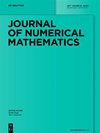采用了显式两步对等方法
IF 4
2区 数学
Q1 MATHEMATICS
引用次数: 25
摘要
摘要本文给出了常微分方程数值积分的一类指数拟合两步对等法。数值格式的构建是为了利用先验的已知信息,通过适应文献中已知的对等方法来确定解的定性行为。给出了具有2和3阶段的方法的示例。通过对一些已知问题的数值测试,证明了这种面向问题的方法的有效性。本文章由计算机程序翻译,如有差异,请以英文原文为准。
Adapted explicit two-step peer methods
Abstract In this paper, we present a general class of exponentially fitted two-step peer methods for the numerical integration of ordinary differential equations. The numerical scheme is constructed in order to exploit a-priori known information about the qualitative behaviour of the solution by adapting peer methods already known in literature. Examples of methods with 2 and 3 stages are provided. The effectiveness of this problem-oriented approach is shown through some numerical tests on well-known problems.
求助全文
通过发布文献求助,成功后即可免费获取论文全文。
去求助
来源期刊
CiteScore
5.90
自引率
3.30%
发文量
17
审稿时长
>12 weeks
期刊介绍:
The Journal of Numerical Mathematics (formerly East-West Journal of Numerical Mathematics) contains high-quality papers featuring contemporary research in all areas of Numerical Mathematics. This includes the development, analysis, and implementation of new and innovative methods in Numerical Linear Algebra, Numerical Analysis, Optimal Control/Optimization, and Scientific Computing. The journal will also publish applications-oriented papers with significant mathematical content in computational fluid dynamics and other areas of computational engineering, finance, and life sciences.

 求助内容:
求助内容: 应助结果提醒方式:
应助结果提醒方式:


